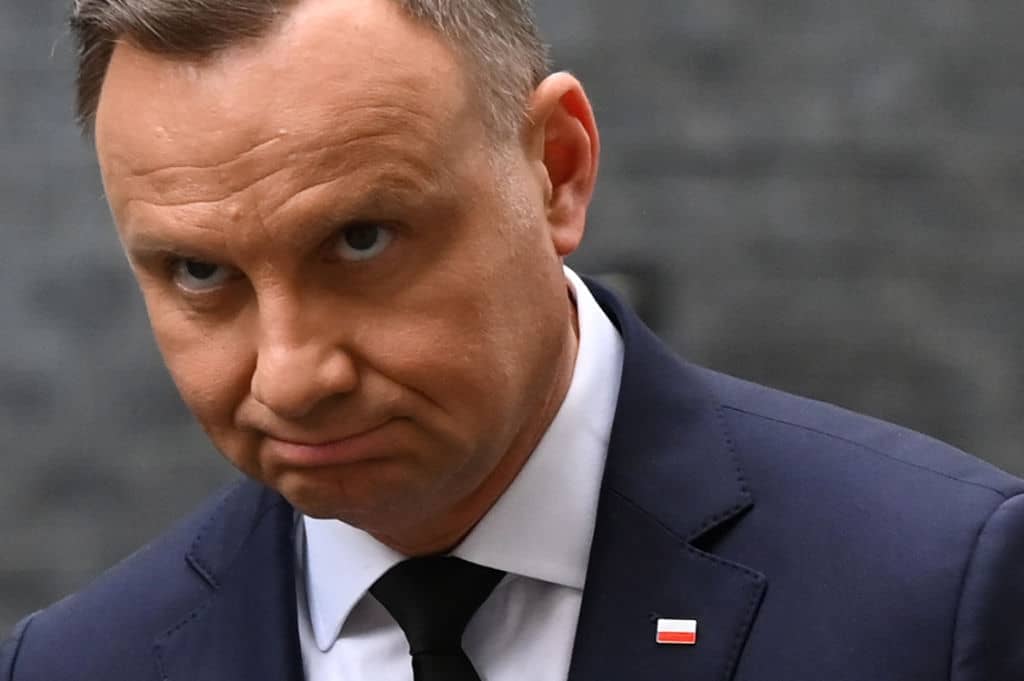Today, Europe needs nothing more than a strong Polish leadership. Poland already counts among the largest providers of military and financial assistance to Ukraine, and Poles have admirably shouldered the burden of Ukrainian refugees flowing into the country. Diplomatically, however, Warsaw punches well below its weight in the EU.
That is a problem in an age when the EU’s natural leader, Germany, has lost its way. Just two days into the exhumations in Izyum, which have exposed yet more alleged war crimes by Russian forces, Germany’s chancellor Olaf Scholz characterised the tone of his phone conversations with Vladimir Putin as ‘friendly’, notwithstanding their ‘very, very different, indeed widely differing views’.
German officials, meanwhile, are flip-flopping: one minute admitting that the Bundeswehr’s stocks have been thoroughly depleted, then twisting themselves into pretzels to argue that it would be unreasonable for Germans to transfer Leopard tanks to Ukraine. To its credit, Germany has already provided Ukraine with howitzers and anti-aircraft Gepard tanks. Poland, too, has donated a considerable number of their own NATO-grade tanks.
Playing hardball with Poland is massively counterproductive at a time when Ukraine, Europe, and the West need it centre stage
Shouldn’t Poland be building a Europe-wide coalition and pulling all the strings it can in order to get Germans, and others, to step up? It does have some strings to pull, after all. In the United States, partly thanks to the Polish diaspora and Warsaw’s reliability as a NATO ally, Poland has commanded unambiguous bipartisan support – and has earned additional respect from Americans since February this year. There is goodwill towards Poland in Westminster too – President Andrzej Duda, after all, was among the small number of world leaders that Liz Truss saw on Sunday, ahead of the Queen’s funeral.
Despite having done many things right in the current war, the government in Warsaw is struggling to project influence in Europe. Yet, it was not that long ago, after all, that French, Polish, and German leaders met at the so-called Weimar-format summits as equals.
In some ways, the Polish government is its own worst enemy. Since the arrival of the Law and Justice Party (PiS) to power in 2015, Poland’s place on the international stage has too often been dictated by the party’s hard-line, paranoid wing, which has seized every opportunity to pick fights with Germany and the European institutions. Brussels’ ham-fisted approach towards both culture war issues and legitimate concerns about PiS’ efforts to gain control over courts and media does not make things any better.
At the present time, Poles are frustrated with delays in the disbursement of EU funds under the bloc’s new 7-year budget and its post-pandemic recovery facility. In June 2022, in a compromise brokered by President Duda, Poland abolished the ‘disciplinary chamber’ created by the PiS at the country’s Supreme Court which had posed risks for the court’s integrity. Yet, because the European Commission (EC) was asking for more comprehensive changes to address politicisation of ‘disciplinary’ action against judges in other courts too, Poland is yet to see any of its European money.
The Commission’s pedantry is understandable as it finds itself under fire from legal groups and European parliamentarians for even tentatively agreeing to disburse the funds. Yet, playing hardball with Poland is massively counterproductive at a time when Ukraine, Europe, and the West need it centre stage, not on the fringes with the likes of Hungary.
At a time when Warsaw and Budapest find themselves on opposing sides of the most important European debate of this decade — the war in Ukraine — the prospect of being jointly deprived of EU funds is bringing them together again. However, by working in tandem with Viktor Orbán, who is explicit about seeing Berlin and Brussels, not Moscow, as his enemies, Poland places itself on the margins of the European conversation.
The more unhinged players in Warsaw never cared about the risk of being isolated. ‘Poland is being robbed, and a leading role in this plundering is played by German politicians led by von der Leyen,’ said Poland’s justice minister Zbigniew Ziobro, from the radical wing of the PiS, responding to the delays in EU funding in August. By early September, however, even the usually level-headed prime minister, Mateusz Morawiecki, had started talking about the need for German second world war reparations, stoking discord.
Taking the escalation to an absurd level, the government-run TV channel TVP claimed last week that Germany was threatening Poland with border changes. The segment, which cherrypicked quotes from Chancellor Scholz’ recent speech and assigned them a grotesque new meaning, prompted a predictable wave of outrage among more radical PiS parliamentarians, effectively hardening the ground against another compromise between Poland and Brussels.
Everyone – from the technocrats in Brussels and those concerned about rule of law in Central Europe, to the Biden administration – should take a deep breath. Important as the independence of Polish courts is to the future of the EU, it pales in comparison to Russia’s aggression in Ukraine – or the consequences of Germany’s current fecklessness. For Warsaw too, substantive success in its war effort must take precedence over grandstanding. Here’s to hoping that calmer heads prevail and that Poland plays the part befitting both its place in Europe and the current historical moment.






Comments